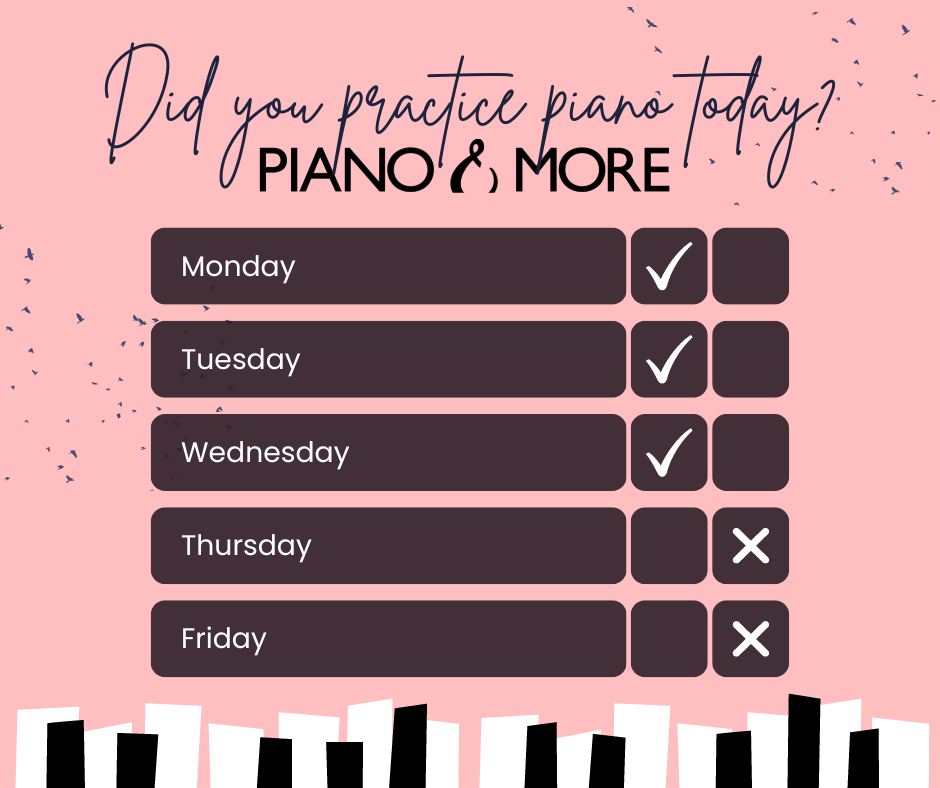|
Continuation (Part 2 of 2)
Tracking progress. How many of you like to check your “steps for the day” on your apple watch? How great do you feel when you see charts reflect your work and results? We want to know if what we are doing is actually working. Keeping track of progress on paper or an app can be very rewarding. Talk to your music teacher about their recommended ways to keep track of practice & progress. There’s so many resources out there now! Looking forward to goals and events. Students are more likely to practice when they know they have a set of goals to achieve. Goals range from being able to play a favorite song to performing a song at a recital or Open Mic! In addition, parents sharing their children's goals with friends and family can also help motivate students to practice regularly. For example, if there is a concert or recital coming up soon, sharing this information with friends and family could help create excitement within the student (and maybe even their parents too). When you share your students' progress and achievements, it will encourage them to keep practicing. Practicing music requires many different kinds of support. The biggest part of practicing music is the student's motivation. They need to feel like they are making progress in their playing, or they will become frustrated and give up on the instrument. Parents can be great sources of encouragement for their children when it comes to learning an instrument. They should encourage their child every time he/she practices well or successfully completes a piece that he/she had been struggling with beforehand. Another great source of motivation can come from other musicians. Encourage your student to connect with other musicians and students, either online or in person. This helps them understand how to use their skills and see how much bigger music is, when you put several instruments together. It can be very exhilarating! Conclusion If you want to keep your students motivated to practice, it's important to remember that they need more than just the right music and a good teacher. They also need encouragement and support from their parents, friends, and teachers. So if you're struggling with motivation in your own life or with your kids', try implementing the above tips, week by week! Written by Nicole Surovcek
0 Comments
Introduction For many young students, practicing piano may be the most challenging part of their musical journey. It's hard to practice when you're tired from school or distracted with other activities. Fortunately, there are ways parents can motivate students to practice piano—and they don't require any special skills or tricks! First, the practice routine. As cliche as it sounds, a reliable routine proves to be one of the best ways to build good habits. If students have a set time that they know when and where they'll be able to practice, then it's easier for them to commit. The best way to make this system work is by creating an environment where practicing piano feels like something that happens naturally rather than something forced through sheer willpower alone. The best way to do this is by setting up a routine where practice is set at specific times every day. Some examples are right before school or right after eating dinner. Next, the practice environment. Learning music theory and reading notes on a staff requires a lot of concentration. Students are learning a new musical language as well as developing new hand eye coordination. Neuron connections are being built! In order to do that, the practice environment needs to be able to facilitate that kind of concentration. First, we want to check that distractions are removed from the room. For example, it wouldn’t be a good idea to have a sibling playing video games in the background. Second, is the room quiet or have a comfortable level of noise? And last is organization! Is the sheet music and/or lesson book easy to locate and use? A messy piano with sheet music scattered about will only add to the list of to-dos, which could discourage the student from jumping into a quick practice session. Show enthusiasm. Parents can motivate their children by showing their own enthusiasm for their child's progress. When a student is playing something, be sure to compliment them on their playing. Make them feel good about what they are doing! This is important when working with younger children who are developing good habits as it helps them attach a positive feeling to a task. Similarly, if you notice your child is struggling with a particular part in the music, do not make it seem like this is a bad thing. Instead, show interest in what they are trying to learn and ask questions about the challenging part being played. Talking about the difficulties will help the student work through it and eventually, build confidence in their music abilities. Like this list so far? Stay tuned for next Monday, for part two! Written by Nicole Surovcek |
Author(s)P&M Teachers: Archives
March 2024
|
QuickLinksLessons in Falls Church |
LEssons in ArlingtonPiano Lessons in Arlington
Guitar Lessons in Arlington Voice Lessons in Arlington Drum Lessons in Arlington LESSONS IN MCLEAN |
|
Registered 501c3 organization EIN 38-4077902 © COPYRIGHT 2023. ALL RIGHTS RESERVED.

